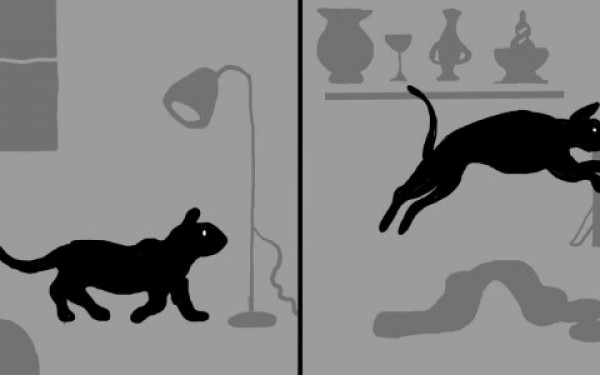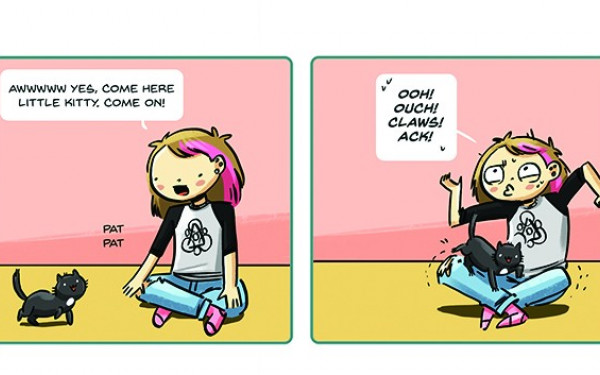CATs Evaluates Shepard’s First Term as President
Alan Shepard aspires to a second term as President of Concordia University.
As he is currently up for review before the end of his first term in July of 2017, we, Concordia Against Tribunals, thought it would be a “purrrfect” time to grade his actions, inactions and decisions over the past few years just as we are graded on our assignments each semester.
Shepard took office in August 2012 following the tumultuous student protests of the spring and was portrayed as a healing figure.
His predecessor had charged 26 students for participating in that year’s heated strike actions, and when Shepard took the reins, one of his first acts as president was to drop the charges against those strikers.
This was seen by many as an act of reconciliation, and recognition of students’ rights to defend their collective interests.
In 2015, the student movement mobilized once more against the austerity measures imposed by the Quebec Liberal government.
These measures affect not only students, but also society as a whole, especially its most vulnerable members.
Given Shepard’s continuous rhetoric of community building, many still hoped that he would maintain a progressive stance towards students’ right to collectively make decisions, including the decision to strike.
At first, the mouse-like steps the administration took seemed encouraging.
The rhetoric resembled accommodation rather than repression: FAQs were set up. So-called “days of reflection” were announced for the associations that had voted to strike.
More importantly perhaps, Shepard broke an anti-strike taboo by not referring to strikes as boycotts, which many administrations had chosen to do, as a strategy to delegitimize strike actions.
Furthermore, a senior administrative promise of abstention from punitive action towards striking students was made to student representatives.
Disappointingly, the period of timid encouragement was short-lived.
The “days of dialogue” unveiled themselves as a PR scam to protect and maintain Shepard’s most prized asset of attracting prospective donors and investors: Concordia’s image and reputation.
No academic accommodations were granted to the Women’s Studies department, notwithstanding the fact that measures, such as semester extensions and other adaptive/flexible accommodations have often been used in other Quebec universities with relative effectiveness and success.
Three professors of the Political Science department filed complaints under the Code of Rights and Responsibilities against more than 25 students for upholding their democratic mandates.
Shepard’s administration chose to forsake its previous engagements by backing the complaints and making the university a co-complainant.
Nearly ten months since the strike on April 1, students still face charges.
After two failed and lengthy mediation processes—one of which cost over $26,000—months of stress and confusion brought about by lack of transparency and effective administrative communication and a first hearing where eight students were issued a letter of reprimand, the charged students have to enter yet another semester with the menace of the tribunals looming over their shoulders.
A primary cause of two failed attempts at informal mediation was the university’s categorical refusal to send a representative, despite its involvement as a co-complainant, retracting themselves yet again.
Despite Shepard declaring “tribunals [as] an independent process,” the head honcho has yet to explain himself about the university’s involvement as co-complainant.
He certainly tried to remain independent of the mediation process, of which he was a party.
The administration has been trying to wash their hands of their responsibilities and the wasted time, energy, resources and finances that have come with the disastrous tribunal process.
“Communication is key in a university, and having this kind of hierarchical structure where the administration is very aloof—that is not the kind of administration that I want to inhabit.” — Alan Shepard
Despite an initially positive start, Shepard’s grades in terms of respect of student democracy have taken a dive to a critical level. In the eyes of CATs, Shepard is currently on academic probation.
Without serious re-evaluation of his actions and perhaps some soul-searching, CATs will have no other option other than to issue him a failing grade.
Should Shepard serve a second term as president, CATs encourages an improvement of senior administrative relations with students through more open, transparent channels of communication. The president should take an active role in helping to facilitate open dialogue between student representatives, professors and administration.
To conclude, we would like to remind Alan Shepard of what he said when he was newly appointed: “Communication is key in a university, and having this kind of hierarchical structure where the administration is very aloof—that is not the kind of administration that I want to inhabit.”
We, CATs, wholeheartedly agree, this is not the kind of administration we want to see.
- Learning French: 2/10
- Taking pictures with International students: 7/10
- Shaking hands with Montreal CEOs and billionaires: 9/10
- Sucking up to the Liberal government: 8/10
- Frequently mentioning his time as Provost at Ryerson: 7/10
- Improving relations with Unions: 3/10
- 2012 amnesty: 8/10
- 2015 rhetoric and engagements regarding the strike: 7/10
- Upholding of these engagements: -1/10
- Facilitation of mediation processes: 0/10
- Current attitude regarding the tribunals: INC

_900_600_90.jpg)




